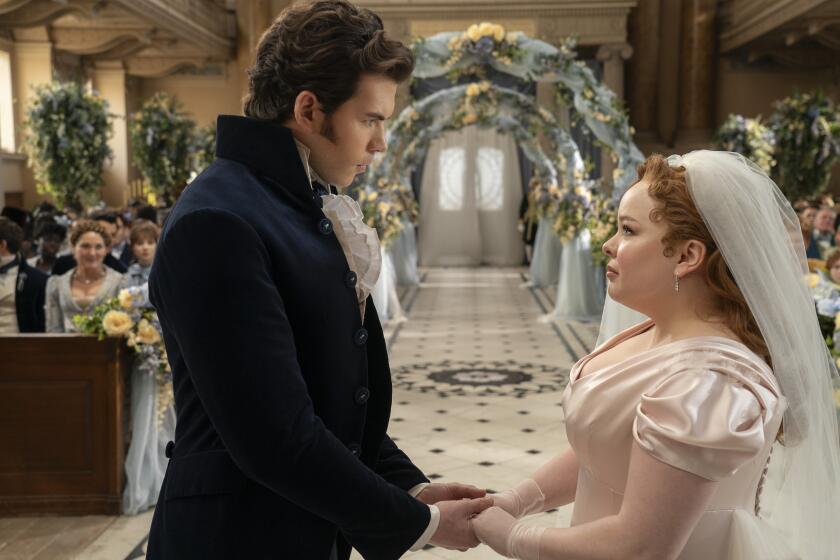THEY ALL HAD TO TAKE THE FALL : ‘Final Cut’ Isn’t Necessarily the Final Accounting
Charles Champlin review s “Final Cut” in today’s Book Review.
A film executive, Marcia Nasatir, discussing why Hollywood novels normally don’t do well, once asserted to one of our writers that “truth can only be told in fiction.” In “Final Cut,” Steven Bach disproves the axiom. The one-time executive at United Artists who presided (with a few others) over the hideous life and death of “Heaven’s Gate” has written a thriller. What’s curiouser, we know the outcome but we’re amazed anew over the excesses along the way to the outcome.
In the end, in one of the traditional rites of Hollywood in a disaster of this magnitude, the whole gang at UA, one by one--like Sam Spade told Brigid--they all had to take the fall.
Ironies collide into ironies like so many pinballs. What a final cut it is that almost five years after all the falls, as “Final Cut” is arriving at bookstores (and leaving quickly; it’s No. 5 on our Southern California Best Seller list) and the whole episode is being rehashed, director Michael Cimino, the villain of the piece, opens his next movie.
The first reviews are mixed on “Year of the Dragon,” which has a lot of the excess of “Heaven’s Gate” (a lot of hysteria, a female being raped and otherwise brutalized, gruesome slaughters, etc.). Our Sheila Benson obviously liked it (see her column on Page 30); on the other side, Richard Corliss in Time says the movie’s “soporific when it is not offensive.” So we await the box office reports to see if this was worth the reported $20-million investment.
Meantime, Bach decided to live in Munich and stay out of the biz.
For those of us who track Hollywood, it’s a riveting chronicle, particularly so because like David McClintick’s “Indecent Exposure,” “Final Cut” describes how so many executives and movie makers, who are held in esteem (at least publicly) are incredibly petty and inadequate. Add to this stupendous egos and power lust.
We can’t be certain of the truth in these tales, since this is one man’s version. (Cimino canceled a planned interview with us earlier this year.) Yet our skepticism about Hollywood ways is reinforced.
For one thing, we’re always aware that the studios feel an incessant need to “handle” the press.
The handling here wasn’t very successful. At one point (the chapter is called “Switchblades”), Bach relates that UA wanted some good press before “Heaven’s Gate” “hit the fan.” So executives sat for an interview with Charles Schreger, our front-line film reporter at the time. In the resulting article, Schreger relayed harsh assessments of UA by the movie community.
A few days before, Todd McCarthy gave the grim news in Daily Variety about trouble up in Montana and a few details about the movie being caught in “budgetary quicksand.” At least the UA executives breathed a little easy because Schreger hadn’t brought up “Heaven’s Gate.”
But the breathing stopped abruptly the next Sunday. We ran an “unauthorized” article by Les Gapay, a former writer for the Sacramento Bee and the Wall Street Journal, who had moved to Montana to run a cherry orchard and write.
He worked on the film as an extra and did a lengthy article full of vivid details on local controversies and how Cimino and crew mistreated the landscape as well as the extras. There were multitudinous accidents due to indifference and/or incompetence, Gapay alleged. One even involved Gapay. A horse stepped on his foot and crushed a toe.
It’s hard to comprehend a business that procreates within itself.
Bach writes that the Schreger article proves that The Times endorses “the cynical observation that the true art form of Hollywood is the deal.” (The concept was first isolated by Joan Didion.)
But you wonder who’s doing the cynicism. Although Bach tells his tale with what has to pass as profound humility, his book is inundated with cynical wheelings and dealings that he tosses off as normal procedure.
During his employment at UA, the studio outsnookered the other players in town by grabbing rights to Gay Talese’s sleazy blockbuster-to-be, “Thy Neighbor’s Wife,” for $2.5 million plus percentages. The UA people seemed ecstatic. Well, no such movie was ever made, so we can surmise with the advantage of hindsight that it was a bad deal. But Bach figures that, in movie terms, it was a success because it showed everybody at the time that UA could wheel and deal.
At one point (Bach relates), Cimino insisted that UA advertise the film as “Michael Cimino’s ‘Heaven’s Gate,’ ” with his name presented in the same size type as the title. And he further demanded that UA require theaters to do likewise on their marquees. Or Cimino would take his movie somewhere else. And UA would look silly. UA gave in.
It’s tough computing degrees of cynical. All we can figure is that there doesn’t seem to be a lot of studio executives sitting around large conference rooms entreating, “OK, people, let’s all get out there and make the very damn best movie that we can in the whole world!”
More to Read
Sign up for our Book Club newsletter
Get the latest news, events and more from the Los Angeles Times Book Club, and help us get L.A. reading and talking.
You may occasionally receive promotional content from the Los Angeles Times.






